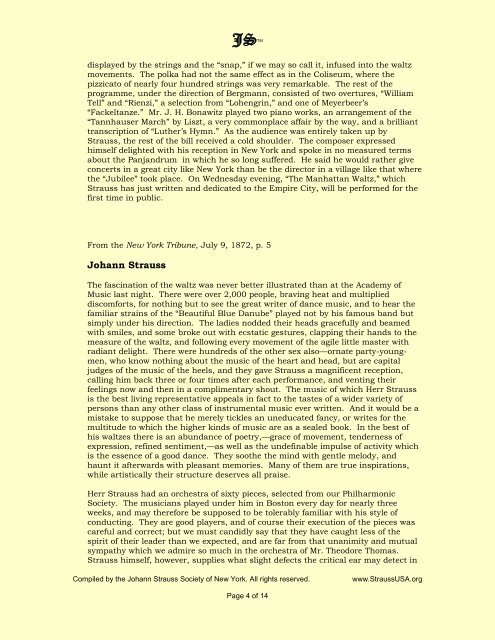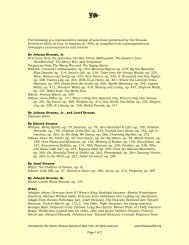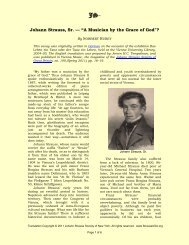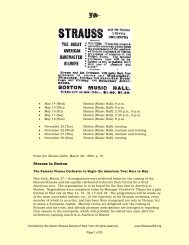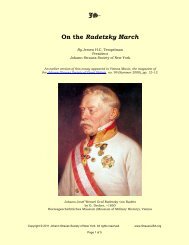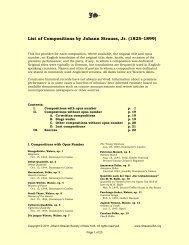here - Johann Strauss Society of New York
here - Johann Strauss Society of New York
here - Johann Strauss Society of New York
You also want an ePaper? Increase the reach of your titles
YUMPU automatically turns print PDFs into web optimized ePapers that Google loves.
JS TM<br />
displayed by the strings and the “snap,” if we may so call it, infused into the waltz<br />
movements. The polka had not the same effect as in the Coliseum, w<strong>here</strong> the<br />
pizzicato <strong>of</strong> nearly four hundred strings was very remarkable. The rest <strong>of</strong> the<br />
programme, under the direction <strong>of</strong> Bergmann, consisted <strong>of</strong> two overtures, “William<br />
Tell” and “Rienzi,” a selection from “Lohengrin,” and one <strong>of</strong> Meyerbeer’s<br />
“Fackeltanze.” Mr. J. H. Bonawitz played two piano works, an arrangement <strong>of</strong> the<br />
“Tannhauser March” by Liszt, a very commonplace affair by the way, and a brilliant<br />
transcription <strong>of</strong> “Luther’s Hymn.” As the audience was entirely taken up by<br />
<strong>Strauss</strong>, the rest <strong>of</strong> the bill received a cold shoulder. The composer expressed<br />
himself delighted with his reception in <strong>New</strong> <strong>York</strong> and spoke in no measured terms<br />
about the Panjandrum in which he so long suffered. He said he would rather give<br />
concerts in a great city like <strong>New</strong> <strong>York</strong> than be the director in a village like that w<strong>here</strong><br />
the “Jubilee” took place. On Wednesday evening, “The Manhattan Waltz,” which<br />
<strong>Strauss</strong> has just written and dedicated to the Empire City, will be performed for the<br />
first time in public.<br />
From the <strong>New</strong> <strong>York</strong> Tribune, July 9, 1872, p. 5<br />
<strong>Johann</strong> <strong>Strauss</strong><br />
The fascination <strong>of</strong> the waltz was never better illustrated than at the Academy <strong>of</strong><br />
Music last night. T<strong>here</strong> were over 2,000 people, braving heat and multiplied<br />
discomforts, for nothing but to see the great writer <strong>of</strong> dance music, and to hear the<br />
familiar strains <strong>of</strong> the “Beautiful Blue Danube” played not by his famous band but<br />
simply under his direction. The ladies nodded their heads gracefully and beamed<br />
with smiles, and some broke out with ecstatic gestures, clapping their hands to the<br />
measure <strong>of</strong> the waltz, and following every movement <strong>of</strong> the agile little master with<br />
radiant delight. T<strong>here</strong> were hundreds <strong>of</strong> the other sex also—ornate party-youngmen,<br />
who know nothing about the music <strong>of</strong> the heart and head, but are capital<br />
judges <strong>of</strong> the music <strong>of</strong> the heels, and they gave <strong>Strauss</strong> a magnificent reception,<br />
calling him back three or four times after each performance, and venting their<br />
feelings now and then in a complimentary shout. The music <strong>of</strong> which Herr <strong>Strauss</strong><br />
is the best living representative appeals in fact to the tastes <strong>of</strong> a wider variety <strong>of</strong><br />
persons than any other class <strong>of</strong> instrumental music ever written. And it would be a<br />
mistake to suppose that he merely tickles an uneducated fancy, or writes for the<br />
multitude to which the higher kinds <strong>of</strong> music are as a sealed book. In the best <strong>of</strong><br />
his waltzes t<strong>here</strong> is an abundance <strong>of</strong> poetry,—grace <strong>of</strong> movement, tenderness <strong>of</strong><br />
expression, refined sentiment,—as well as the undefinable impulse <strong>of</strong> activity which<br />
is the essence <strong>of</strong> a good dance. They soothe the mind with gentle melody, and<br />
haunt it afterwards with pleasant memories. Many <strong>of</strong> them are true inspirations,<br />
while artistically their structure deserves all praise.<br />
Herr <strong>Strauss</strong> had an orchestra <strong>of</strong> sixty pieces, selected from our Philharmonic<br />
<strong>Society</strong>. The musicians played under him in Boston every day for nearly three<br />
weeks, and may t<strong>here</strong>fore be supposed to be tolerably familiar with his style <strong>of</strong><br />
conducting. They are good players, and <strong>of</strong> course their execution <strong>of</strong> the pieces was<br />
careful and correct; but we must candidly say that they have caught less <strong>of</strong> the<br />
spirit <strong>of</strong> their leader than we expected, and are far from that unanimity and mutual<br />
sympathy which we admire so much in the orchestra <strong>of</strong> Mr. Theodore Thomas.<br />
<strong>Strauss</strong> himself, however, supplies what slight defects the critical ear may detect in<br />
Compiled by the <strong>Johann</strong> <strong>Strauss</strong> <strong>Society</strong> <strong>of</strong> <strong>New</strong> <strong>York</strong>. All rights reserved.<br />
www.<strong>Strauss</strong>USA.org<br />
Page 4 <strong>of</strong> 14


